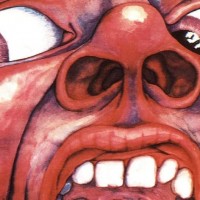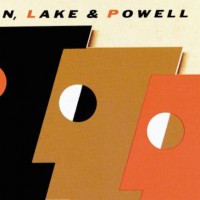Greg Lake, a founding member of both King Crimson and Emerson Lake and Palmer, died having left a lasting imprint on rock. Crimson produced a standard-bearing prog-rock debut, before Lake helped send progressive music to new heights in ELP.
He and King Crimson leader Robert Fripp had shared the same guitar teacher as youngsters, giving the pair a tight musical bond that lasted from 1969’s genre-defining In the Court of the Crimson King (a Top 30 U.S. hit that also went to No. 5 in the U.K.) through to 1970’s In the Wake of Poseidon. Lake left with deep insight into the band’s – and progressive rock’s – embryonic early years.
“When I joined a band, Robert wasn’t in a band at all, and he used to come around and follow me as a guitar player,” Greg Lake told Something Else! in 2012. “He’d travel in the van, along with my band. He just used to hang around the stage while we played. Sometimes, he’d do a duet with me. So, Robert and I knew each other’s playing intimately. We had the same guitar teacher; we learned the same guitar lessons – and we were dragged up the same way, basically. So, I knew what he could play; he knew what I could play. That’s one of the things that was underpinning King Crimson – that Robert and I are almost one person, in a sense.”
The opportunity to form one of rock’s legendary supergroups eventually led Lake away. Emerson Lake and Palmer’s first, self-titled album – powered by “Lucky Man,” a song Lake had begun work on as a 12 year old, became a No. 4 U.K. smash, and reached the American Top 20, as well.
“The first four chords I learned, I made this song out of them – that was ‘Lucky Man,'” said Lake, who passed after a cancer battle on Dec. 7, 2016 at age 69. “Nothing happened to it. I couldn’t have recorded it at the time, of course – but I just remembered it, for some reason, word for word. Quite often, in the early days, when I would write a song, I wouldn’t finish it. I would come up with the initial idea; I may write a verse. But then I would stop there. It was only for amusement. For some reason, though, I finished ‘Lucky Man,’ right to the end. So, there was something unusual about that, really. During the writing process, it unfolded in some sort of natural, almost predestined way. Then when ELP made the first record, it got used on that album.”
Greg Lake recorded “Lucky Man” – which quickly became his signature – largely alone, until Keith Emerson returned to complete it with one of prog’s most memorable solos.
“To be honest with you, Keith couldn’t really find a part to play on the song – so, he went down to the pub. I made the record, basically,” Lake once said in a Something Else! Sitdown. “When he got back, it was pretty much finished and he said: ‘Wow.’ What he’d heard when he left was just me singing this plaintive little folk song. When he came back, what he was hearing was five-part harmony, triple-tracked acoustic guitars and all the rest of it – and he was quite shocked. He said: ‘I better play on it.’”
It just so happened that on that very day, one of the then-new Moog synthesizers had been delivered to the studio. Inspiration struck. “I said: ‘Why don’t you try out the new Moog on it?’ Of course, Keith said: ‘I haven’t had the chance to experiment with it yet; I’m going to need some time.’ I said: ‘Give it a go anyway.’ He went out there and started experimenting with the pormento – you know, how long it takes to go from one note and then to slide up to the other note. What the recording is, is him experimenting with the pormento,” Lake remembered “He experimented with it, and it just so happened.”
Thankfully, Greg Lake thought to hit the “record” button. “In those days, we used to run out of tracks, and we had no more tracks to record on to,” Lake added. “Keith wanted to do another take. But I said: ‘No, we have to keep the take.’ We almost fell out over it. In the end, I said: ‘Please, Keith come in and listen to what we’ve recorded before we erase it – because if we erase it, it’s gone forever.’ And he came in, and he heard it. Well what would you say? You’d have to be deaf not to hear how good it is, right? So, it was a kind of perfect – because he hadn’t preconceived it.”
By 1972, they’d created an album in Trilogy that Lake always thought of as their pinnacle moment. Emerson Lake and Palmer soared through a set that brilliantly mixed multi-sectioned long-form compositions with punchier more digestible rock songs.
“If I had to pick out our best album, I think that would be the best one for me,” Lake once told us. “There’s a few reasons for that, you know. First of all, I think, you described it very well – it’s the point where it all comes together. The innovative conceptual thoughts, the musical dexterity, the bonding of the band as a sort of brotherhood, it all came together there. … I like the beauty of that album; there’s a lot of beauty on Trilogy.”
As the 1980s dawned, and interest in traditional prog waned, Emerson Lake and Palmer went their separate ways. That led Greg Lake to an initial, and quite fruitful, collaboration with Gary Moore.
“It was a strange time, because when ELP sort of retired, or semi-retired, we didn’t really break up, we just stopped playing – just because we wanted to do other things,” Lake said. “Just get away from being ELP, really. But for a while I felt awfully dislocated. For the last decade, the only musical identity I had was ELP and, all of a sudden, it stopped. For a while, I was just sort of spun. I really had no sense of direction, because I had every freedom in the world and yet all of musical fabric had been stripped immediately by the band not being there anymore. So it was a question of doing something different. I started to work with all kinds of people. I worked with Toto for a while. When we finally did get together in the same band, I learned a lot about Gary.”
Along the way, Greg Lake had become one of the most familiar voices in prog, rivaled only by Yes’ Jon Anderson and the Moody Blues’ Justin Hayward, before Emerson Lake and Palmer split. He briefly worked with Keith Emerson again in 1986, but this time with Cozy Powell taking over for Carl Palmer. The newly christened Emerson Lake and Powell scored a radio hit in “Touch and Go,” but Lake said this refashioned lineup never quite gelled.
“Cozy was great. When he joined the band, it was very, very nice. He’s a great player, and a lovely guy,” Lake told us. “But the strange thing was, it wasn’t ELP anymore. The chemistry was different. Not necessarily bad, but just different. There’s something that Carl brought to the band which made ELP. You know when you mix chemicals together in a chemistry class, you put two or three together and nothing happens. Put the next one in, and the whole thing froths. That’s a bit like ELP. Carl Palmer is very effervescent.”
Emerson died earlier this year, following Powell’s death in 1998 – leaving no surviving members of their splinter group. (Palmer still performs with Asia, the band he was working with during the Emerson Lake and Powell years.) The original ELP reunited in the ’90s, and again – perhaps most memorably – in 2010, and Greg Lake toured with Ringo Starr’s All-Starr Band, but otherwise he largely remained a solo act thereafter.
It wasn’t easy. His early solo work combined prog rock with pop music in a way that Yes later had great success with, but Lake’s career away from ELP never really took flight. After so long in world-renowned groups, Lake basically had to start over. “When you leave a band, the public doesn’t just automatically swap their allegiance and their loyalty from that act to you being a solo artist,” he said. “It’s something you have to earn.”
Greg Lake’s final tours were intimate affairs, with only his guitar and a unique brand of storytelling that seemed to resonate in new ways as his years of greatest fame receded.
“It’s an obvious thing to say, but the music of King Crimson and ELP was for a lot of people the sort of backdrop of their youth – amongst other bands, of course,” Lake told us. “In a way, I think people are interested to reflect back on that, to relive and understand more about what happened then. It’s a nice place go, your youth or your formative years. I don’t see anything bad in it. What could be bad in reflecting on the years you really loved, the festivals you went to that you remember fondly, or a favorite ELP song?”
- The Bright Spots in George Harrison’s Troubled ‘Dark Horse’ Era - December 29, 2024
- The Pink Floyd Deep Cut That Perfectly Encapsulates ‘The Wall’ - November 29, 2024
- Why Pink Floyd’s ‘The Endless River’ Provided a Perfect Ending - November 11, 2024



